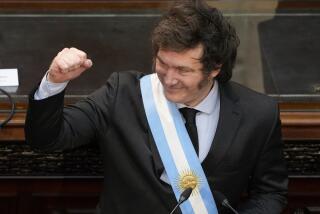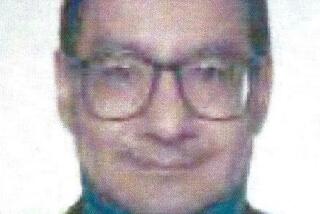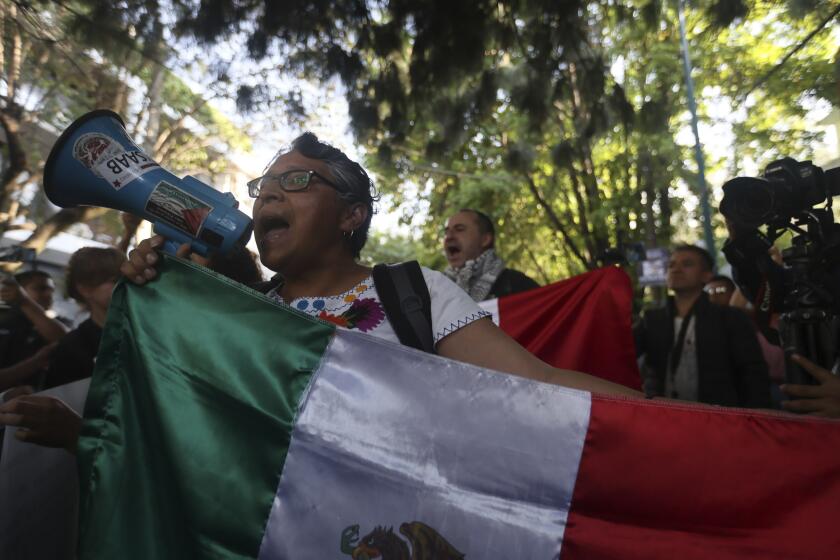U.S.-Cuba plan to reestablish ties follows spy swap, prisoner release
Sweeping away more than half a century of official U.S. animosity, President Obama announced plans Wednesday to restore diplomatic relations with Cuba and broaden business ties after the swap of several jailed spies and the release of an American contractor held in a Havana prison.
Obama and Cuban President Raul Castro sealed the historic deal in a 45-minute telephone conversation Tuesday after 18 months of secret talks between the two governments. Canada’s government hosted most of the talks, but they included a meeting arranged by Pope Francis, the first Latin American pontiff, at the Vatican in October.
The phone call marked the first extended contact between leaders of the two countries since Washington cut diplomatic relations with Havana in January 1961, two years after rebels seized power, later declaring a communist government. The communists have ruled the island nation since.
Obama instructed Secretary of State John F. Kerry to initiate high-level discussions with Cuba and reestablish a U.S. Embassy in Havana. The administration also will ease travel restrictions to Cuba, allow an increase in remittance levels, expand commercial sales and exports to the island and review Cuba’s designation since 1982 as a state sponsor of terrorism, a special source of tension.
In simultaneous TV appearances in Washington and Havana, Obama and Castro hailed the deal as long overdue, and both called for lifting harsh economic sanctions that date to the depths of the Cold War. Republican leaders in Congress, however, showed little willingness to do so.
“These 50 years have shown that isolation will not work,” Obama said. “It’s time for a new approach.”
Obama said he was “under no illusion” about continued repression in Cuba. But he added, “Neither the American nor the Cuban people are well served by a rigid policy that is rooted in events that took place before most of us were born.”
The surprise deal was announced shortly after Cuba released Alan Gross, 65, a subcontractor with the U.S. Agency for International Development, an arm of the State Department, who was arrested in 2009 for distributing telecommunications equipment in violation of Cuban laws.
Sentenced by a Cuban court to 15 years in prison, Gross spent five years in confinement. A U.S. government plane flew him, his wife, Judy, his lawyer and three members of Congress to Andrews Air Force Base, close to his home in Rockville, Md., shortly before noon.
Appearing gaunt but fit, with a wide grin that revealed at least one missing front tooth, Gross offered profuse thanks to Obama and others who had worked for his release. He even thanked those who brought him M&Ms in captivity.
“I am incredibly blessed — finally — to have the freedom to resume a positive and constructive life,” he said at a news conference.
The administration sent back three former Cuban intelligence agents, part of the so-called Cuban Five spy ring, who had been imprisoned in Florida since 2001. A Justice Department spokesman said that Obama commuted their sentences and that the U.S. Marshals Service flew them back to Cuba.
Two of the five had already been released after serving their sentences. The Cubans had become a cause celebre among Americans opposed to U.S. policies toward the island nation, and were hailed at home as “freedom fighters” who were unfairly imprisoned. Their images appear on billboards in Havana and at the city’s international airport.
U.S. officials insisted the trade was not for Gross, who was released on humanitarian grounds, but for an unnamed Cuban who spent nearly 20 years in prison and whom Obama called “one of the most important intelligence agents that the United States has ever had in Cuba.” He was flown out of Cuba on a separate plane.
Brian P. Hale, spokesman for the Office of the Director of National Intelligence, said the U.S. spy had helped identify and convict a number of Cuban intelligence operatives in the United States, including a former Defense Intelligence Agency senior analyst, a former State Department official and his wife, and members of the Red Avispa network in Florida, which included the Cuban Five.
“In light of his sacrifice on behalf of the United States, securing his release from prison after 20 years — in a swap for three of the Cuban spies he helped put behind bars — is fitting closure to this Cold War chapter of U.S.-Cuban relations,” Hale said.
U.S. officials said Cuba’s government also agreed to free 53 inmates whom U.S. authorities consider political prisoners, and that some already had been released. Cuban authorities routinely imprison, albeit briefly, opponents of the government and other dissidents.
Castro wore an olive-green military uniform when he appeared on national television to announce the release of Gross and the other prisoners as part of what he called the possible start of significantly better relations with the United States.
Midway through his comments, church bells began ringing across Havana in apparent celebration of the news. Large crowds gathered in streets and public places and they listened attentively, news services reported.
Castro said Obama’s effort to improve relations “deserves the respect and recognition of our people.”
But Castro said the embargo, “which causes enormous human and economic damage to our country, must end.” He called on U.S. lawmakers to “remove the obstacles that impede or restrict the links between our peoples, the families and the citizens of both our countries.”
He said that “profound differences” remain on other issues, such as human rights and sovereignty, but that he wants to begin a “dialogue” on them.
The Vatican hailed the agreement to establish diplomatic relations “with the aim of overcoming … the difficulties which have marked their recent history.”
White House aides hinted Obama might even visit Cuba before he leaves office in 2017. “I certainly wouldn’t rule out” a presidential visit,” Press Secretary Josh Earnest told reporters.
Kerry said in a statement that he looked forward to being the first secretary of State to visit Cuba in 60 years.
An assistant secretary of State will lead a delegation to Havana next month, and the administration will drop objections to Cuba’s participation in a summit meeting of the Organization of American States. The two governments also will begin working together on issues such as counter-narcotics, environmental protection and human trafficking, officials said.
The deal won’t open the door to American tourism to Cuba, but it will loosen rules governing official visits, journalism, professional and educational meetings and the arts.
Americans will be able to send Cubans remittances of $2,000 every three months, up from $200. The deal will open the way to freer banking and will allow U.S. travelers to bring home up to $400 worth of goods from Cuba, including $100 in tobacco and alcohol products.
Obama, a longtime advocate of “engagement” with adversary governments, signaled at the beginning of his first term that he wanted to pursue normalization of relations with Cuba.
In 2009, he moved to allow more Cuban American families to travel to and from the island, and in 2011 he expanded the number of travelers permitted to visit for educational, cultural, religious and journalistic reasons. In the end, he waited until after the midterm elections in his second term to make a deal.
The administration’s move represents a bet that it can do more to move Cuba away from its repressive system by engaging it than by continuing to try to isolate it. The administration restored diplomatic relations with the military-led government in Myanmar in 2012 in a similar diplomatic gamble.
Obama’s move sparked strong opposition from a bloc of anti-Castro members of Congress.
Sen. Robert Menendez (D-N.J.), the outgoing chairman of the Senate Foreign Relations Committee, said the prisoner swap “will invite further belligerence toward Cuba’s opposition movement and the hardening of the government’s dictatorial hold on its people.”
Rep. Mario Diaz-Balart (R-Fla.) denounced Obama as the “appeaser in chief” who had given in to a “brutal anti-American state sponsor of terrorism.”
Rep. Ed Royce (R-Fullerton), chairman of the House Foreign Affairs Committee, said it’s unclear what Cuba is doing to merit the change in policy. “It doesn’t look like much,” he said.
Longtime advocates of relaxing the sanctions, including other members of Congress, human rights groups and agricultural interests, hailed the announcement as historic.
“This is a major, major step,” said Peter Hakim of the Inter-American Dialogue, a Washington think tank that focuses on Latin America. “Both sides are making a really strong beginning toward restoring normal relations.”
But Cuban policies on human rights and other sensitive issues are not about to change overnight.
A harsh crackdown now “could be a major embarrassment,” Hakim said. There are “risks with easing restrictions.”
Richter reported from Washington and Wilkinson from Mexico City. Times staff writers Kathleen Hennessey and Christi Parsons in Washington contributed to this report.
More to Read
Start your day right
Sign up for Essential California for news, features and recommendations from the L.A. Times and beyond in your inbox six days a week.
You may occasionally receive promotional content from the Los Angeles Times.








